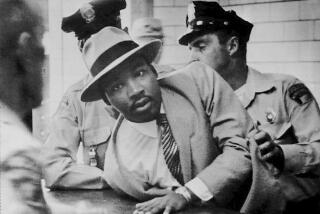1st Volume of King Papers Shows How He Overcame Hatred
- Share via
STANFORD — After six years of intense research, the first volume of papers written by the Rev. Martin Luther King Jr. was unveiled Thursday, showing a devout young man who overcame an early hatred of whites.
Volume I, which covers the years from King’s birth in 1929 through 1951, also contains never-before published letters from King’s childhood, said Clayborne Carson, director and senior editor of the King Papers project.
Written on a child’s typewriter, many of the early letters from King to his traveling parents contain simple news of church and home life. In sum, the first volume of a planned 14-book set shows a youthful King learning the lessons of racism, sometimes the hard way, and then resolving to battle discrimination through his ministry, Carson said.
The first 500-page volume, “Called to Serve,” is scheduled to be published Feb. 28 by the University of California Press, and will cost $35. Carson, a Stanford University professor who was selected by King’s widow, Coretta Scott King, to head the project, hopes to publish a new volume every year through 2006. But he said that schedule might be optimistic.
The first volume was delayed 18 months as eight full- and part-time project staffers took time to document plagiarism in some of King’s early academic writings--material that will appear in Volume II with footnotes.
The plagiarized passages were contained in a 343-page Boston University dissertation, “A Comparison of the Conceptions of God in the Thinking of Paul Tillich and Henry Nelson Weiman,” which King wrote in 1955.
King, who won the Nobel Peace Prize in 1964, was assassinated at age 39 on April 4, 1968, in Memphis, Tenn., after leading a nationwide movement to gain greater freedoms and equality for blacks in America.
He said he first experienced racism at age 6, when he and a white friend had to go to separate schools and could not play together. “I was greatly shocked, and from that moment on I was determined to hate every white person,” King wrote at age 21 in a college essay entitled “An Autobiography of Religious Development,” which is included in Volume I. “I did not conquer this anti-white feeling until I entered college and came in contact with white students through working in interracial organization.”
More to Read
Sign up for our Book Club newsletter
Get the latest news, events and more from the Los Angeles Times Book Club, and help us get L.A. reading and talking.
You may occasionally receive promotional content from the Los Angeles Times.







